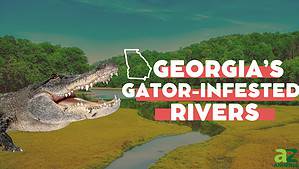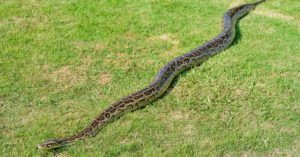Like caimans, alligators are reptiles from the Alligatoridae family. The alligator is a large but shy animal. Surprisingly, this terrifying reptile prefers to retreat when it senses a human approaching it. And if you live in environments where they exist, you may have come across their poop at least once.
Although alligator poop is not a widely researched topic, there are interesting facts about this animal’s excreta. Discover everything you’ve ever wanted to know about alligator poop in this article.
What Does The Alligator Poop Look Like?
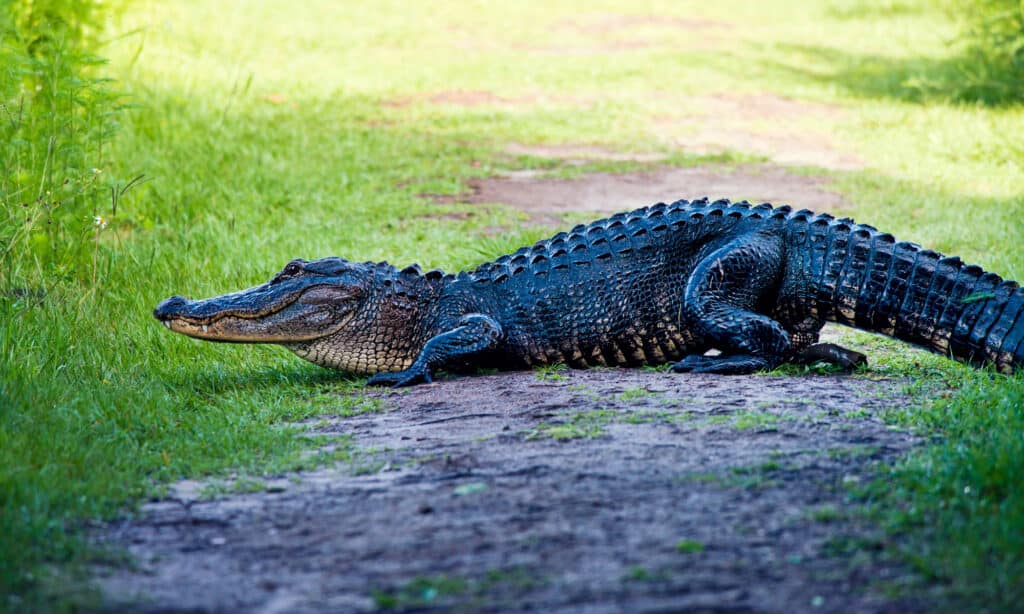
The poop of the alligator often changes as it dries off.
©Svetlana Foote/Shutterstock.com
The alligator poop is similar to bird poop as it also contains both feces and urine. This unique way of passing out waste is possible because alligators don’t have a separate passage for urine and feces. So both waste products are discharged together as poop.
Interestingly, the digestive waste of this reptile often changes color as it dries off. The poop has a green or brown color with a white spot when fresh. It then switches to either beige, buff, or olive as it dries, and it becomes white when it is completely dry. The size, however, depends on the size of the food it has eaten, and it is rounded at both ends.
How Does The Alligator Poop?
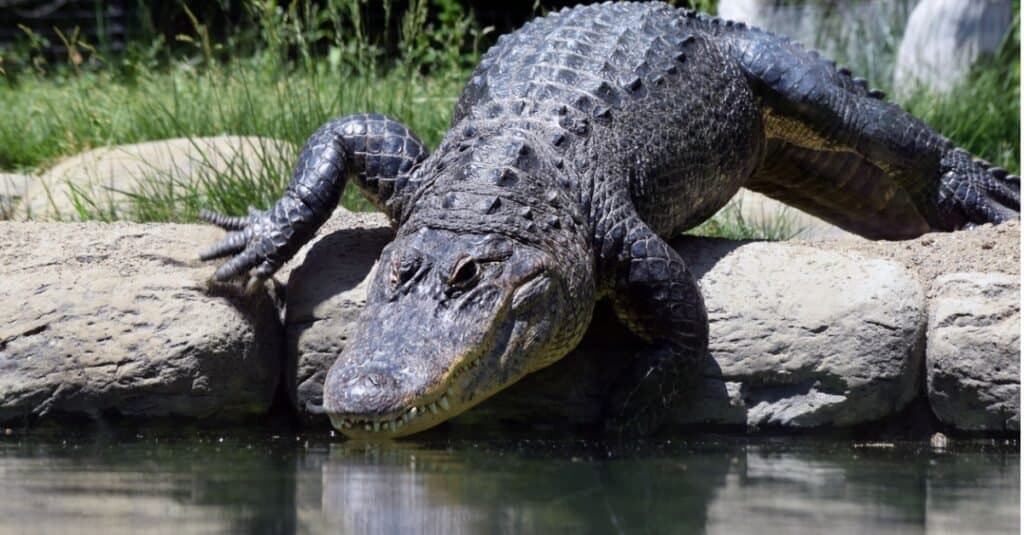
Alligators pass poop out through their cloaca.
©iStock.com/Bradley Proxmire
One feature alligators have in common with birds is that they pass out poop through their cloaca. And like birds, each alligator has a gizzard and a true stomach. After an alligator swallows its prey, the food goes from the mouth into the gizzard through the esophagus. The gizzard contains particles that grind the food which is passed into the true stomach afterward.
The true stomach of an alligator contains very strong acidic fluids. This acidic fluid digests all the food particles brought in from the gizzard, including hairs, feathers, and bone. Then, the feces and urine combine together inside the cloaca after which they both are passed out as poop. Digested nitrogen in a small portion is also excreted alongside the poop in the form of uric acid.
Is Alligator Poop Harmful?
Alligator poop can be harmful to humans. Although alligator poop cannot be easily accessed like that of farm animals, care should be taken when you come across one. Why? The digestive waste of this reptile can host many microorganisms that are harmful to humans. Examples of such harmful microbes that can be found in an alligator poop are salmonella, E. coli, and Leptospirosis.
Salmonella is a bacteria that can be gotten from contact with an alligator poop. Salmonella infection can cause diarrhea, fever, stomach cramps, and some other intestinal problem. The bacteria majorly infects the intestines of its host. Symptoms of the infection can last up to 7 days.
Asides from Salmonella, Leptospirosis is another illness commonly found in alligator poop. Leptospirosis can cause high fever, headache, bleeding, and many other complications without treatment. In severe cases, it can lead to death! So to avoid infections, it’s best to avoid touching the excrement of alligators. If you do, make sure you wash your hands immediately.
Does Alligator Poop Smell?
Yes, alligator poop stinks, just like most animal poop. Some claim that it smells like fish. Interestingly, even after the poop is dry, the smell of an alligator’s poop will still linger because of the ammonia contained in its poop.
What Do Alligators Eat?
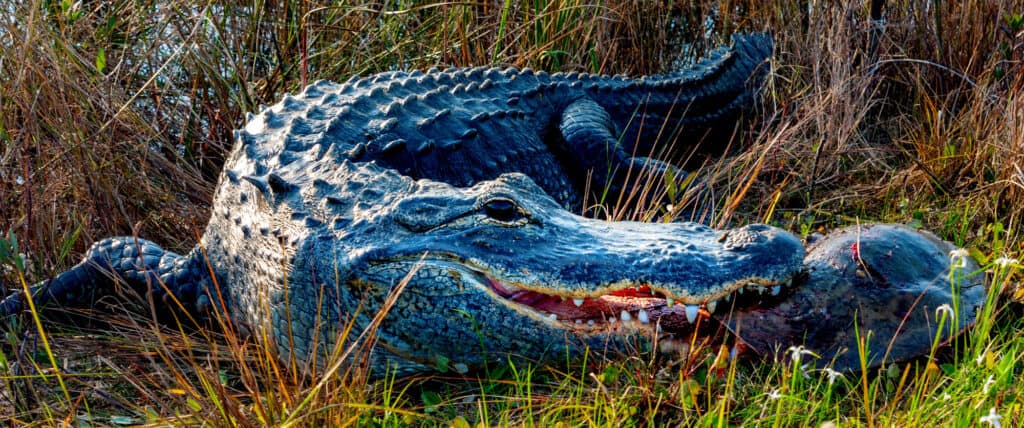
Alligators have a diet that includes fish, turtles, birds, and mammals.
©Peter Aronson/Shutterstock.com
The diet of alligators is vital to their poop. Without food, living things cannot pass out waste. So what do alligators eat?
Alligators are primarily carnivores; this means that they mainly eat animal-based diets. But they sometimes eat plant-based diets like fruit. An adult alligator feeds on bigger prey like fish, turtles, birds, and mammals, while young alligators feed on smaller food like small fishes, insects, and amphibians. These reptiles are opportunistic feeders, i.e., they feed on different kinds of food and eat what is available to them at that particular time.
As cold-blooded animals, alligators don’t need to eat much food. The energy they need to regulate the body is mostly gotten from the environment. They eat mainly for the purpose of building and maintaining their body mass.
Difference Between Alligator Poop And Lizard Poop
Alligators and lizards are both reptiles, and they pass out poop through a cloaca, hence the comparison between their poop. While there are similarities between an alligator and a lizard poop, there are also lots of differences.
Though the size of an alligator’s poop depends on the size of its food, its poop is bigger than that of a lizard. Unlike alligators, the size of a lizard’s poop depends on the size of the lizard.
The lizard poop is typically a long brown or black-pellet-shaped with a white substance, while the alligator poop is green or brown with white spots.
Is Alligator Poop Useful?
Alligator poop has its economical value; it can be used as manure. This is because it is a good source of nutrients as it contains nitrogen, phosphorus, and potassium, which are very good for the soil. So if you can get your hands on their poop, you can use them as manure for your plants. But remember, it’s best not to touch the poop with your bare hands.
The photo featured at the top of this post is © iStock.com/Bradley Proxmire
Thank you for reading! Have some feedback for us? Contact the AZ Animals editorial team.




